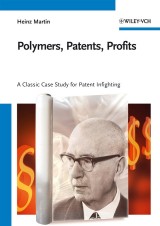Details

Polymers, Patents, Profits
A Classic Case Study for Patent Infighting1. Aufl.
|
76,99 € |
|
| Verlag: | Wiley-VCH |
| Format: | |
| Veröffentl.: | 27.02.2007 |
| ISBN/EAN: | 9783527610396 |
| Sprache: | englisch |
| Anzahl Seiten: | 294 |
DRM-geschütztes eBook, Sie benötigen z.B. Adobe Digital Editions und eine Adobe ID zum Lesen.
Beschreibungen
This is the fascinating, first-hand story of the groundbreaking invention by Nobel prizewinner Karl Ziegler and the patent fights between his research team at the Max Planck Institute of Carbon Research in Germany and the "giants" of the petrochemicals industry, such as Du Pont and Esso. The author joined Ziegler's group throughout the entire period, providing an entertaining case study of an innovative chemical discovery, presenting interesting historical as well as scientific information.<br> An impressive example of the fights between academia and industry concerning patent rights and the economic utilization of academic research innovations.
PREFACE<br> INTRODUCTION<br> THE INVENTION<br> First Observations 1950/1953<br> Standard Oil of India<br> Philips Petroleum Company<br> Du Pont<br> Max-Planck-Institute, Muhlheim on the Ruhr<br> K.Ziegler, H.Breil, E.Holzkamp and h.Martin<br> Experiments between May and December, 1953<br> Experiments December 1953 to April 1954<br> Letter from Ziegler to his Patent Attorney von Kreisler<br> Montecatini, Milano/G. Natta and Coworkers<br> First Experiments with Ziegler-Catalysts<br> Natta, Orsoni and DeVarda's Visit to Ziegler at Muhlheim on May 19,1954<br> K.Ziegler and Coworkers<br> H.Martin-Experiments May-July 6, 1954, H.Breil -<br> Masters Thesis<br> H.Martin -<br> July 1954: Polypropylene<br> 1952 to 1954 Polypropylene (Review)<br> Appraising the Historical Course of the Invention from a Year 2000 Vantage Point<br> THE CHEMICAL INDUSTRY CONNECTION<br> Farbwerke Hoechst<br> Petrochemicals Limited<br> Steinkohlenberbauverein (Hard Coal Mining Society) /<br> Bergwerksverband (Mine Association)/<br> Ruhr Area Coal Industry<br> The "Run" of Prospective U.S. Licensees<br> Gulf Oil, Koppers, Dow, Union Carbide und Monsanto<br> Esso, the Straggler<br> Du Pont<br> Mitsui Chemical, the First Japanese Licensee<br> Summation<br> Back to the Ruhr: Ruhrcoal and Bergwerksverband<br> August through December 1954: Montecatini steps up its own developments<br> The first Ziegler/Montecatini Pool-Agreements<br> Polydiene<br> Karl Ziegler and H.Martin/<br> Max-Planck-Institut fur Kohlenforschung<br> S.E. Horne/Goodrich Gulf Chemicals Inc.<br> Giulio Natta and Coworkers/Montecatini<br> D.R.Smith and R.P. Zelinski/Phillips Petroleum Co<br> PATENT RIGHTS WORLDWIDE, PATENT APPLICATIONS-PROSECUTION, OPOSITION, PRIORITIES<br> The Package of the First Six German Patent Applications<br> Foreign Patent Protection for the Inventions of Ziegler and Coworkers<br> The Situation in the United States<br> Polypropylene: Ziegler/Natta, Conflict as to the Priority<br> Contentions Proceedings<br> Montecatini<br> Du Pont<br> Compromise and Concessions<br> Du Pont Sought Further Advantages<br> The History of Patent Issuance from a Year 2000 Vantage Point<br> INNOVATION, MARKET DEVELOPMENT, PRODUCTION<br> The Market Situation<br> The Rush for Licenses 1953-1972, Lucrative Second Half 1970-1990<br> The Marketing of Ziegler Polyolefins<br> Montecatini's Poll Polyolefin Licenses<br> Research and Production<br> First "new" so-called independent Catalysts<br> The Split between Montecatini and Ziegler in United States<br> Review<br> THE AMERICAN CHALLENGE<br> Hercules, Esso, Phillips, Dart Seek Advantages<br> Infringement Action Ziegler versus Phillips Petroleum<br> Hercules forces Ziegler, into legal action against Dart<br> Between Dallas and New Orleans<br> Eastman Kodak<br> Max Fischer, Over and Over<br> Amoco, Arco and Novamont Launch New Attacks<br> 18 Years of Feud with Dart<br> Liability Determination<br> Decision Concerning the Amount of Damages<br> A Tentative Record of the '115 Patent<br> Lex Ziegler<br> Product Patent Protection for "Polypropylene"<br> "High-Speed-" or "High Mileage-" or "Ziegler-Catalysts of the Second and Third Generation<br> Nippons Export of Automobiles in the United States<br> "The last Chapter"<br> Epilog<br> INDEX<br>
"The text is set out in five chapters and includes several hundred references, so is very comprehensive.... This volume has something for the historian of the modern chemical industry, and also for the specialist interested on how the patent system works." (<i>Materials World</i>, February 2009) <p>"The book offers eloquent testimony of how difficult and costly it is to convert research results into commercial success stories." (<i>RFP</i>, 1/2008)</p>
Heinz Martin has been a close colleague of Prof. Ziegler at the Max-Planck-Institute of Carbon Research in Muhlheim/Ruhr (Germany) and played an important key role in the invention of Ziegler's Polyolefine catalysts in 1953/54. In 1970 he became Co-director of the Studien- und Verwertungs GmbH (founded in 1925), which became the Studiengesellschaft Kohle GmbH in 1955, a trustee of the MPI in Muhlheim, with H. Martin as director.
Any groundbreaking scientific discovery or invention is potentially of general interest and is therefore also the basis for profitable follow-up developments and innovations. From the scientist's point of view it is desirable to save his innovative achievements for his own profit. This why the state grants exclusive rights to the scientist in the form of patents. In turn, the scientist has to disclose the details of the discovery. <br> In the mid 1950s, Nobel prizewinner Karl Ziegler and his colleagues at the Max Planck Institute of Carbon Research established a technology that had an outstanding impact on the worldwide production of polypropylenes and polyethylenes, the fundamental components of the plastics industry. <br> This is the fascinating, first-hand story of the patent fights between the research team and the "giants" of the petrochemicals industry, such as Du Pont and Esso. The author was part of Ziegler's group throughout the entire period, resulting here in an entertaining case study of an innovative chemical discovery, presenting interesting historical as well as scientific information.<br> An impressive example of the fights between academia and industry concerning patent rights and the economic utilization of academic research innovations.

















